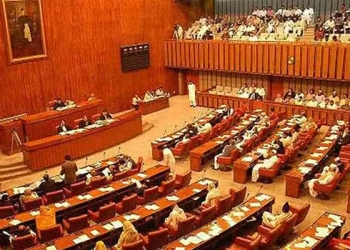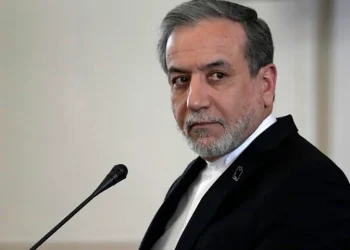ISLAMABAD: The Supreme Court of Pakistan has reserved its verdict on a suo motu case concerning the legality of the deputy speaker’s ruling and the subsequent dissolution of the National Assembly by the president.
The verdict will be announced at 7:30pm in the evening. Meanwhile, security has been beefed up at the apex court premises with television footage showing riot police deployed outside the apex court.
The case is being heard by a five-member bench headed by Chief Justice Umar Ata Bandial and includes Justice Munib Akhtar, Justice Jamal Khan Mandokhel, Justice Ijazul Ahsan, and Justice Mazhar Alam Khan.
Clear that deputy speaker’s ruling is wrong: CJP
Earlier, during the hearing, Chief Justice of Pakistan (CJP) Umar Ata Bandial observed that it was clear that the April 3 ruling of NA Deputy Speaker Qasim Khan Suri to dismiss the no-confidence motion submitted against the prime minister was “wrong”.
During the hearing, the chief justice remarked that there would be no stability in the country even after the restoration of the National Assembly that had been dissolved as a result of the ruling.
“The real question at hand is what happens next,” he said, adding that now the PML-N counsel and the Attorney General of Pakistan (AGP) Khalid Jawed Khan would guide the court on how to proceed. “We have to look at national interest,” he said, adding that the court would issue a verdict today.
Not defending speaker’s ruling: AGP
The AGP — who was the last to give his arguments — began by informing the court that he would not be able to give details of the recent meeting of the National Security Committee in an open courtroom.
The Attorney General argued that everyone needed to be loyal to the state. He said that he is not defending the ruling. “However, I think new elections are the only solution,” he added.
The AGP claimed that the no-confidence motion against Imran Khan was “dismissed” on March 28. According to him, it was important to show the support of majority at the time of tabling the resolution. Since the opposition had 161 members in favour of tabling the motion on March 28, the AGP said the move had failed then and there.
Justice Akhtar replied that according to this line of argument, if 172 members (majority) had approved the motion, the prime minister would have been ousted. To this, the AGP said the three to seven days mandated by the Constitution before a final vote on the resolution was to give the prime minister a chance to win back angry lawmakers.
However, the CJP, at this point, said that at the leave grant stage 172 members were not required. “They are required at the time of the voting.” He then added that if the speaker approved the resolution on March 28, then “it’s the end of the topic”.
If that’s the case, the AGP said, then the case is over since on April 3, the same speaker passed the ruling to dismiss the motion. However, Justice Bandial said that he wanted to hear from the AGP on the main issue which was dissolution of the National Assembly.
“The assembly was dissolved only after the no-confidence motion was dealt with,” Khan said. He also pointed out that the assembly would stand dissolved if the president did not make a decision on the prime minister’s advice within 48 hours.
We have to see, the CJP said, the time difference between dissolving the assembly and the ruling of the speaker.
Here, Justice Mandokhel said that the court could not decide on the basis of circumstances and results. “Court has to pass a verdict keeping the Constitution in view,” the judge said. “This way any speaker who comes tomorrow will do as he pleases.”
Suo motu notice
On Sunday, CJP Bandial had taken suo motu notice of the situation after the deputy speaker’s dismissal of the no-confidence motion against the premier, clubbing multiple petitions filed by various parties with it.
After a brief hearing, a written order was issued which said the court would like to “examine whether such an action (dismissal of the no-trust motion on the basis of Article 5) is protected by the ouster (removal from the court’s jurisdiction) contained in Article 69 of the Constitution.”
Article 69 of the Constitution essentially restricts the court’s jurisdiction to exercise authority on a member or officer of parliament with respect to the functions of regulating parliamentary proceedings or conducting business.
“No officer or member of Majlis-i-Shoora (parliament) in whom powers are vested by or under the Constitution for regulating procedure or the conduct of business, or for maintaining order in Majlis-i-Shoora, shall be subject to the jurisdiction of any court in respect of the exercise by him of those powers,” clause two of the Article reads.
The court had also ordered all state functionaries and authorities — as well as political parties — to refrain from taking any advantage of the current situation and stay strictly within the confines of the Constitution.








![This handout photo released by the IRGC’s official Sepah News Telegram channel shows smoke billowing from a site bombed by Israel in Tehran early on June 13, 2025 [Sepah News/AFP]](https://mmnews.tv/wp-content/uploads/2025/06/Israel-attack-on-Iran-1-350x250.jpg)























